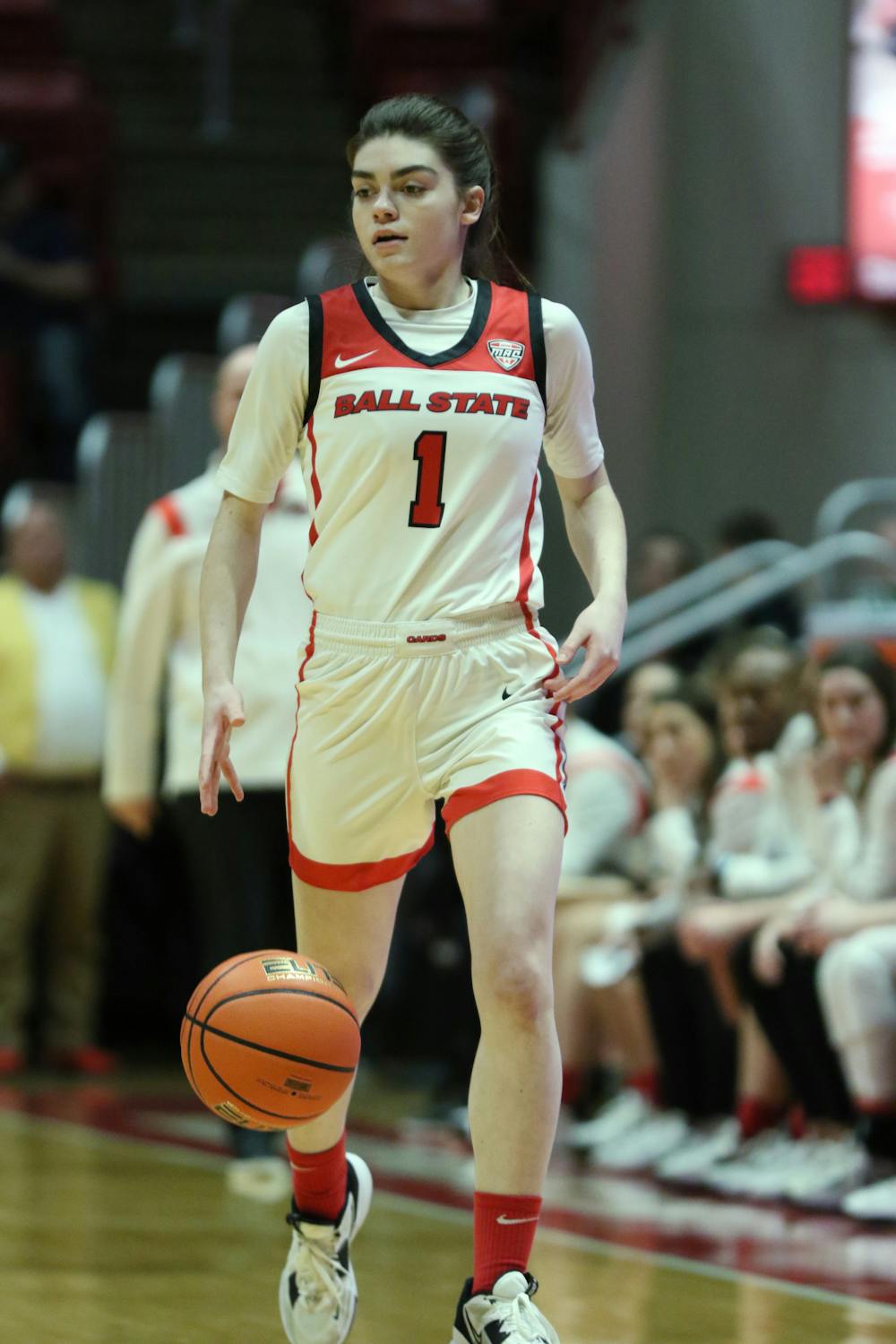Around a basketball court, it's 93,910 laps. That’s how far Hana Mühl is from her hometown of Zagreb, Croatia.
In simpler terms, it’s 4,767 miles. Muncie, Indiana, and her hometown are separated by six time zones and a large body of water, the Atlantic Ocean. Mühl and her family are four of Zagreb’s 806,000 residents.
Mühl comes from a basketball-rich family; both of her parents played, and so does her older sister, Nika Mühl.
Hana believes this is why she originally started playing basketball.
“I think it was genetically determined,” Hana said. “I started playing basketball several years ago because of my sister and just because my whole family was into basketball.”
On the flip side, Hana’s father Darko said that he and his wife tried everything they could to get his two daughters away from basketball.
“We know there are a lot of injuries in women’s basketball, that’s why my wife stopped playing,” Darko said. “We put [Hana] in swimming, tennis, and all the different sports, but she ended up playing basketball just like [Nika].”
Nika is a third-year at the University of Connecticut (UCONN) and is on the women's basketball team there. She is an elite passer and has proved it by leading the NCAA in assists per game with 9.1 per game.
“[Nika is] my role model,” Hana said. “Hers and my basketball style are pretty similar. She always has advice for me when I need it, on and off the court.”
Darko said that their relationship growing up was cat and dog-like, but now that they’ve grown up, they are closer.
“They learned to live with each other,” Darko said. “Lately, in the last couple of years, they’ve grown to have a really good relationship.”
Hana and Nika share a handful of similarities on the court, and that may be because they both played on the same club team. Both of them are guards who can see the whole court, but at the same time, they’re very tough.
“They’ll square up,” Ball State head coach Brady Sallee said while laughing. “They’re tough kids, like they will foul just because they like the contact. They’re just physical. Both [are] pass-first kids, too. There’s a similar mindset they have that I think is very unselfish, very high IQ kids.”
Growing up playing on the same club basketball team, Hana started to develop a nickname that has grown over time: Baby M.
“Nika was getting lots of attention on social media and by top five and ten schools,” Darko said. “At that same time, Hana’s recruiting just started, so everyone just started calling her Baby Mühl, and it kinda just developed to Baby M from there. I guess it’s kind of like she’s our baby, the youngest daughter.”
The nickname is embraced by Hana and Nika as Nika has a tattoo that says Baby M in honor of her younger sister.
Hana is not unfamiliar with high-stakes games as she played in the International Basketball Federation. She was part of the U14, U16, and U18 Croatian National teams. In her U18 season, she averaged 13.4 points per game, 3.6 rebounds, 3.8 assists and 1.4 steals a game.
“That was my favorite part of playing basketball honestly,” Hana said. “It’s like the best feeling to play and represent your own country. The adrenaline and competitiveness playing with the girls on the highest level and against all the best players over the world is amazing.”
The trophy case at Hana’s house is not shy of awards. In 2020 and 2021, she was named part of the All-Star Five, which is an individual award given to the best player in their respective position. She also won two national championships in 2019 and 2021.
Flying across the Atlantic Ocean to the United States and to other countries in Europe is not new to Hana. In 2017, she played in the Women’s American Basketball Association where she won the championship and was named the most aaluablepPlayer of the championship game.
Hana said the barrier between basketball in Europe and basketball in America is a tough one to break.
“It’s very different,” Hana said. “I’m still adjusting to this type of basketball, and it’s really hard. The style is very different, like the way the game is played.”
In European basketball, the referees tend to hold their whistles longer and not call a foul after initial contact.
“They allow much more contact [in Europe] than they do in the States,” Darko said. “The game is more physical.”
Sallee has picked up on this and has tried to help Hana play the way he wants it played.
“She’s starting to really figure out the way we want the game played in America,” he said. “We’re starting to see the talent come through a little bit.”
Not only are the referees more lenient in Europe, but the role that each position is played is different as well.
“You don’t see people here in Europe like Caitlin Clark,” Darko said. “Yeah, she is amazing, but she wouldn’t be a point guard. Point guards are playmakers here. For example, a point guard is someone like John Stockton who passes more than they shoot. The roles are different here than they are in America.”
Even though Hana is far away from home, she still has people who have her back. Ball State has three other international basketball players that have taken Hana under their wing.
“They’re always here for me when I need help,” Hana said. “They helped me a lot, especially on the super hard days, because we are all so far away from home.”
Hana is seemingly molding into the team extremely well, Sallee said.
“She’s a great personality,” Sallee said. “Her teammate[s love] her genuineness. You get exactly what you see.”
Hana is always on the court smiling, dancing, or making faces at her teammates. The Cardinals get to see a bit of Hana’s personality when she is on the court.
“She’s a happy camper,” Darko said.
The recruiting process for Hana was fairly unusual as she was originally committed to Illinois, but following a coaching change, she de-committed and opened her recruiting back up.
“I was over in Europe recruiting. I was watching stuff over there, and I saw her play,” Sallee said, “Clearly, we liked what we saw then. As all the recruiting stuff was taking place, she moved pretty quick and committed to Illinois.”
A little over a year went by, and Illinois went through a change and Hana decommitted. Following the decommitment, Sallee was fast to recruit her.
“When they had the coaching change, and she went and decommitted, I mean, we reached out and got ahold of her dad and got the ball rolling,” Sallee said.
The decision to come to Ball State wasn’t easy for Hana.
“It was hard, but it wasn’t at the same time,” Darko said. “The coach didn’t say ‘You can’t come here,’ but Hana just wasn’t in their plan, so she decommitted and tried to find another home, and thankfully she did.”
Though the decision may have been a little tough, Hana is enjoying her time at Ball State.
“I’m super happy to be here because [Sallee] definitely knows a lot, and I think it shows,” Hana said. “He puts the pieces together really well and has done well this season. I think that we will do pretty well. I mean, we already are doing good.”
Sallee has used what UConn Women’s Basketball’s head coach Geno Auriemma has said about Nika and connected it to Hana.
“It’s funny, you listen to Geno talk about Nika, and a lightbulb goes off in my head as I’m learning to coach Hana,” Sallee said.
Coach Sallee said Hana has transitioned well onto the team.
“She’s been good to compete against [sophomore guard] Ally [Becki],” Sallee said. “She can get up in her face and guard her and play her hard.”
With over half a season under her belt, Hana has plenty of time to keep developing and growing her game. Averaging just 9.8 minutes a game, her stats almost mirror her sister Nika’s first-year season at UConn, who averaged 24.4 minutes a game. If you take the number of minutes played and make them equal to each other, Nika and Hana’s stats would be roughly the same.
Hana has adapted to not only her basketball team but also American culture. Her favorite place to eat in America is Panda Express.
“I had it yesterday and will have it today,” Hana said.
The smiles and laughs Hana has on the court don’t go unnoticed by her coach.
“[Hana] is a great personality on the team, and it will be fun to watch her grow and develop as a player,” Sallee said.
Contact Brayden Goins at brayden.goins@bsu.edu or on Twitter @b_goins14.





